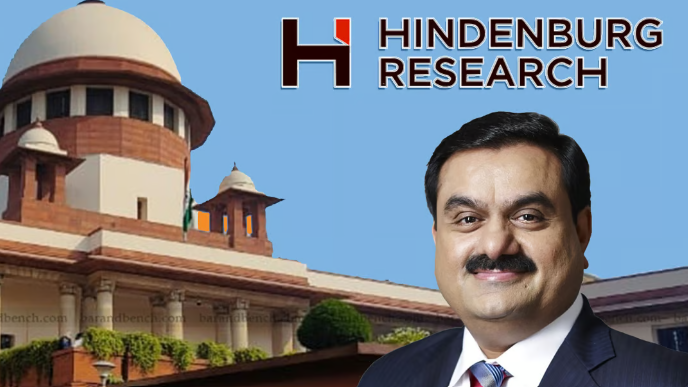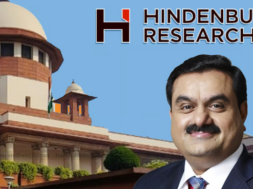
Hindenburg: SC dismisses the demand for an SIT, directs SEBI to probe if the US firm harmed Adanis’ investors
Virendra Pandit
New Delhi: Nearly a year after a US-based firm’s claims caused mayhem in Adani share prices, the Supreme Court on Wednesday dismissed stock manipulation and accounting fraud allegations against the Indian conglomerate, and directed the Securities and Exchange Board of India (SEBI) to probe in three months if the Hindenburg Research’s report violated the law and harmed the investors.
The top court also refused to interfere in the SEBI’s ongoing probe, noting that there were no grounds to suspect its investigation or transfer the probe from SEBI to a Special Investigation Team (SIT).
“The power to transfer investigation must be exercised in exceptional circumstances. Such powers cannot be exercised in the absence of cogent justifications.”
The apex court’s ruling immediately buoyed up the Adani Group’s stocks, which surged despite the market’s slow pace on Wednesday. Adani Energy Solutions spiked 17.83 percent, NDTV by 11.39 percent, and others by nearly 10 percent on the BSE. Adani Ports and Ambuja Cements hit 52-week highs.
A three-judge Bench, headed by Chief Justice of India DY Chandrachud, dismissed the findings of an NGO, Organized Crime and Corruption Reporting Project (OCCRP), about alleged stock manipulation and accounting fraud against Adani Group. It directed the SEBI to invoke its powers of investigation and probe if the Hindenburg report on short-selling amounted to a violation of law, causing harm to investors, the media reported.
The Bench, also comprising Justices JB Pardiwala and Manoj Misra, had reserved the judgment on November 24.
CJI Chandrachud, reading out the operative part of the judgment, said such unsubstantiated third-party reports by media or organizations cannot be relied upon as conclusive proof against a statutory regulator like SEBI. They do not amount to cogent evidence.
The judgment said the judiciary’s review of the regulatory framework of SEBI was limited to checking if there was arbitrariness or violation of fundamental rights. The SEBI probe did not suffer from irregularities. It had completed 22 out of 24 investigations against the Adani Group. The court asked the market regulator to complete the remaining two investigations expeditiously, within three months.
The threshold to transfer the investigation from SEBI to another agency was not present. The transfer is usually done only in exceptional/extraordinary circumstances. A situation of willful or glaring apathy/bias had not been shown by SEBI, the judgment said.
The petitioners’ allegation that SEBI suppressed information received from the Directorate of Revenue Intelligence (DRI) about the Adani group was misconceived. The court upheld SEBI’s argument that DRI had closed the probe against Adani in 2016 and the issue had traveled up to the Customs Excise & Service Tax Appellate Tribunal (CESTAT) and the Supreme Court.
The court had heard claims that SEBI had “concealed” an alert received from the DRI about “Adani having siphoned off the money and invested them in Adani listed companies through entities based in Dubai and Mauritius.”
According to the petitioners’ counsel Prashant Bhushan, the DRI letter to the then SEBI chairperson, UK Sinha, on January 31, 2014, alerting that “there may be stock market manipulation being committed by the Adani group of companies using the money siphoned off through overvaluation in the import of power equipment by Adani group”.
The DRI was at the time investigating a case of overvaluation of the import of equipment and machinery by various entities of the Adani group from a UAE-based subsidiary.
The court also dismissed allegations that members of the Justice AM Sapre Committee were in a position of conflict of interest.
Bhushan contended that one of the committee members, former SBI Chairman OP Bhatt, was working as the Chairman of Greenko, a leading renewable energy company. Since March 2022, Greenko and Adani Group have been working in a close partnership to provide energy to Adani Group facilities in India, he submitted.
Another committee member, advocate Somasekhar Sundaresan, who was recently appointed an Additional Judge of the Bombay High Court, Bhushan said, had appeared for the Adani Group in 2006 and had been on “several SEBI committees.”
The Justice Sapre Committee was constituted by the Supreme Court on March 2, 2023, to investigate the causal factors and existence, if any, of regulatory failure that led to investors losing crores due to volatility in the securities market in the wake of the Hindenburg Research’s report accusing the Adani Group of manipulation of share prices and account fraud.
On August 23, 2023, SEBI told the Supreme Court that it had completed the probe in all but two allegations against the Adani group and is still awaiting information from five tax havens on actual owners behind foreign investors investing in the conglomerate.
The apex court directed the Centre and SEBI to look into whether Hindenburg Research violated any law on short-selling. If there is a violation, they may take any action by law.
On the OCCRP report, released on August 31 last year, the Supreme Court said that it cannot be taken into account to doubt the investigation and findings by the market regulator.
The CJI said that a “third-party organization report without any verification cannot be relied upon as proof.”
Moreover, the court also noted that media reports cannot be considered as conclusive evidence but only as inputs in such cases.













